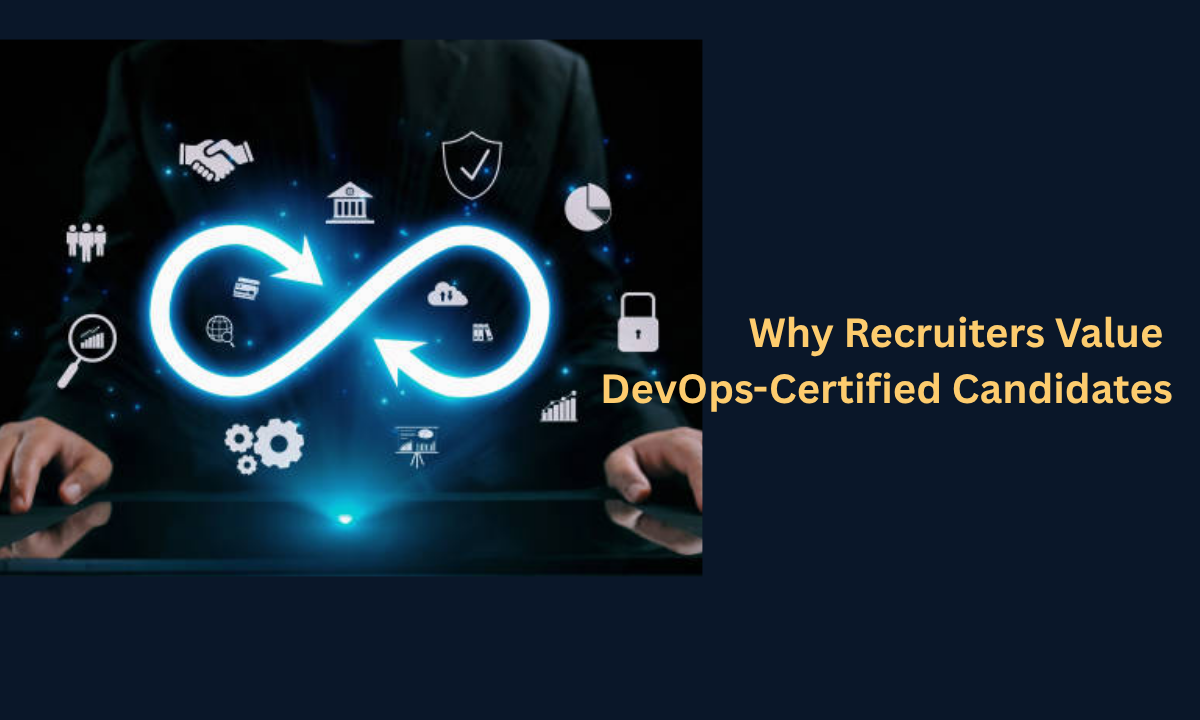Table of contents:
|
1. The Rising Demand for DevOps Professionals |
|
2. What Recruiters Actually Look For in a DevOps Certified Professional |
|
3. How a Certified DevOps Master or Equivalent Elevates Your Career Path |
|
4. Why Training Institute in Bangalore and a DevOps Course in Bangalore Matter |
|
5. Don’t Miss This: Why Certification Alone Isn’t Enough |
|
6. Key DevOps Skills and Tools Recruiters Want |
|
7. Decision Time: Choosing the Right Certification & Training |
|
8. Wrapping Up |
|
9. FAQs |
In my role at Apponix, I’ve seen how earning a DevOps certification can profoundly impact a candidate’s career and their appeal to hiring managers.
When you invest in becoming a DevOps certified professional or even aim for being a Certified DevOps master, you’re telling recruiters that you possess both the mindset and the verified capability to thrive in modern, automated, cloud-native environments.
Today, I’ll walk you through why this credential matters, what recruiters are looking for, and how you, as a candidate, can align your DevOps skills, tool proficiency, and career path to stand out, especially if you’re exploring a DevOps course in Bangalore through a top training institute.
The Rising Demand for DevOps Professionals

Companies today are under pressure to deliver software faster, maintain higher reliability, and adapt to changing conditions in cloud and microservices environments. As a result, organizations look for people who not only understand development and operations but can bridge the gap, someone who brings automation, monitoring, feedback loops, and collaboration. A DevOps certification signals that you’re committed to that discipline.
Recruiters in tech-hiring teams increasingly treat certification as a positive filter: it suggests you’ve learned widely accepted best practices, you're familiar with DevOps tools, and you align with the culture shift needed. According to industry commentary, certifications like the AWS Certified DevOps Engineer or Kubernetes credentials “… tell potential employers … you’re serious about your craft and that you’re keeping up with the latest advancements.”
In short, in the world of DevOps, a certificate isn’t the only asset. It opens doors and gives you an edge.
What Recruiters Actually Look For in a DevOps Certified Professional
From our hiring discussions at Apponix and discussions with partner companies, I see that recruiters focus on several key areas when assessing candidates with a DevOps certification:
Verification of base skills:
A certification demonstrates you’ve formally studied key concepts such as continuous integration/continuous delivery (CI/CD), infrastructure as code, containerization, monitoring, and cloud provisioning. As one article puts it: “Certifications provide a uniform standard for evaluating candidates regardless of geography or educational background.”
Familiarity with DevOps tools:
Recruiters expect you to be comfortable with tools such as Docker, Kubernetes, Terraform, Jenkins, Ansible, etc. In fact, listings like “experience with configuration management, CICD, repositories” frequently appear under DevOps skills requirements.
Ability to adopt the DevOps culture:
It’s not just about tools; it’s about thinking in terms of collaboration, automation, feedback, and iteration. Certified candidates often have had exposure to this mindset. One employer observed: “Certified professionals often excel at facilitating smoother communication between development and operations teams.”
Reduced hiring risk:
For recruiters, a candidate who holds a recognized certification is often less of an unknown. The credential reduces uncertainty. Does this person know what they claim? Does this person understand modern DevOps workflows? It gives confidence.
When you combine a DevOps certification with real projects, it becomes a powerful statement on your résumé.
How a Certified DevOps Master or Equivalent Elevates Your Career Path
At Apponix, we encourage students to think beyond simply “getting certified” and instead view certification as an accelerator toward their DevOps career. Here’s how it plays out:
Faster entry and upward mobility:
Having a certificate can help you move from system-admin or developer roles into DevOps roles. Employers often view it as proof you’re ready for the transition.
Better negotiation power:
Certified professionals often command higher salaries or more senior job titles because they’ve shown investment in their skillset. For example: “A certified DevOps engineer … can negotiate better salaries compared to their uncertified peers.”
Wider tool and platform exposure:
Certification programs typically cover major tools and methodologies. Thus, strengthening your toolkit and making your profile more adaptable.
Enhanced credibility:
When you hold credentials that map to recognized frameworks or toolsets, hiring managers see you as a candidate with validated knowledge and commitment.
Strategic progression:
After certification, you can chart roles like DevOps Engineer → Senior DevOps Engineer → DevOps Architect / SRE / DevOps Lead. The certification gives you momentum.
Thus, for anyone pursuing a DevOps career path, combining certification with practical experience creates a compelling story for recruiters.
Why Training Institute in Bangalore and a DevOps Course in Bangalore Matter
If you’re based in India, and particularly in Karnataka, choosing a strong training institute in Bangalore for your DevOps training makes sense for several reasons:
-
Bangalore is a tech hub with many companies hiring for DevOps roles, making local networks and training outcomes more relevant.
-
A well-structured DevOps course in Bangalore will typically cover hands-on labs, real tool exposure (Docker, Kubernetes, Terraform, Jenkins), mock interviews, and job-ready skills, bridging the gap between theory and recruiter expectations.
-
Being trained locally means you can participate in face-to-face mentoring, industry meet-ups, and network with hiring managers in the region, increasing your visibility.
-
At Apponix, we ensure that our training aligns with the certifications recruiters value and the DevOps skills they demand, so you walk into the job market with both the credentials and confidence.
Therefore, if you’re in Bangalore (or willing to travel), attending a local training institute gives you an added advantage in the regional job market.
Don’t Miss This: Why Certification Alone Isn’t Enough
One important caveat from our hiring experience at Apponix is this: while a DevOps certification is a strong asset, recruiters will still look for proof of applied experience. Holding the certificate opens the door, but what you’ve done with those tools and principles matters. For instance:
-
Can you demonstrate how you used CI/CD pipelines in a project?
-
Have you built containerized applications and deployed them in cloud environments?
-
Have you worked with teams across development and operations and solved real problems?
Recruiters often filter first by certification but then ask for evidence of practical application. At Apponix, we emphasise that training programmes should include hands-on labs, real tool usage, and project work, not only exam preparation.
Key DevOps Skills and Tools Recruiters Want
To further enhance your attractiveness to recruiters, focus on building proficiency in these areas:
-
CI/CD pipelines using Jenkins, GitLab CI, or GitHub Actions.
-
Container and orchestration tools such as Docker and Kubernetes.
-
Infrastructure as Code (IaC) with Terraform, CloudFormation, and Ansible.
-
Cloud platforms like AWS, Azure, and GCP are often paired with the certification.
-
Monitoring, logging, and observability using Prometheus, Grafana, and the ELK stack.
-
Scripting and automation, e.g., Bash and Python, are essential for many DevOps tasks.
-
Cross-team communication and agile workflows, demonstrating the cultural side of DevOps.
When your certification also ties in these DevOps tools and DevOps skills, you elevate your profile from “certified” to “ready to contribute”.
Decision Time: Choosing the Right Certification & Training
Here’s how I guide students at Apponix:
-
Assess the tool/platform environment you want to work in. If your target companies use AWS, go for the AWS DevOps cert; if containers and Kubernetes are core, CKA is strong.
-
Select a training institute that offers local support. Where you’ll get practical labs and job prep.
-
Choose a course that includes hands-on projects. A simple certificate won’t showcase practiced skill.
-
Build your portfolio: labs, GitHub projects, mini-deployments.
-
Prepare for interviews: showcase how you applied your skills, and talk about tools, automation, and pipelines.
-
Use your certification as a headline and your projects as evidence.
At Apponix, our DevOps course is geared precisely to this path. Teaching the tools, providing labs, and helping you build the profile recruiters favour.
Wrapping Up
As someone deeply involved in preparing candidates at Apponix, I can attest that a DevOps certification has become a differentiator in today’s job market. When recruiters face hundreds of resumes, someone who holds credentials, understands the DevOps career path, and has practical exposure to DevOps tools and DevOps skills will stand out. It’s not just about passing the exam; the certificate signals you're committed to learning, that you understand the modern workflows, and that you’re capable of being part of the transformation.
But the certificate alone isn’t the finish line; it’s the foundation. The real value comes when you combine certification with hands-on experience, meaningful projects, and a clear narrative of how you bring value. At Apponix, we help you build that narrative and get ready for what recruiters look for.
If you are planning to move into DevOps, especially from Bangalore or nearby, enrolling in a reputable DevOps course in Bangalore will give you timing, context, and a network. And when you complete it, you’ll be positioned as a DevOps certified professional or even a Certified DevOps master candidate, someone employers want to hire.
Make your certificate more than a badge; make it your career launchpad. With the right attitude, skills, and credentials, you’ll be the candidate recruiters prefer.
FAQs
Q: What is DevOps certification?
It’s a formal credential that validates your knowledge of DevOps practices, ranging from CI/CD, infrastructure as code, containerization, monitoring, and cloud provisioning. It shows recruiters you’ve studied those areas intentionally.
Q: Can I become a DevOps certified professional by just training?
Training is the first step; earning certification makes you a certified professional. But to truly impress recruiters, you should pair the certification with applied experience in using DevOps tools and solving real problems.
Q: What is a Certified DevOps Master?
The phrase usually refers to advanced levels of certification or recognition (senior certifications, mastery exams) that indicate you not only understand fundamentals but can also lead DevOps initiatives and architect solutions.
Q: What are the main DevOps tools and DevOps skills recruiters expect?
Recruiters expect tools like Docker, Kubernetes, Terraform, Jenkins, Ansible, Git, monitoring tools, and cloud services (AWS, Azure, GCP). They also expect skills in scripting, automation, CI/CD pipelines, collaboration between dev and ops teams, agile workflows, and continuous improvement.
Q: If I’m in Bangalore, how do I pick a training institute in Bangalore or a DevOps course in Bangalore?
Look for institutes with a strong curriculum covering the latest tools, hands-on labs (not just theory), job-placement support, local industry tie-ups, and good reviews. Ideally, the course should prepare you for recognized certification and build real projects. At Apponix, we focus on this exact model.




